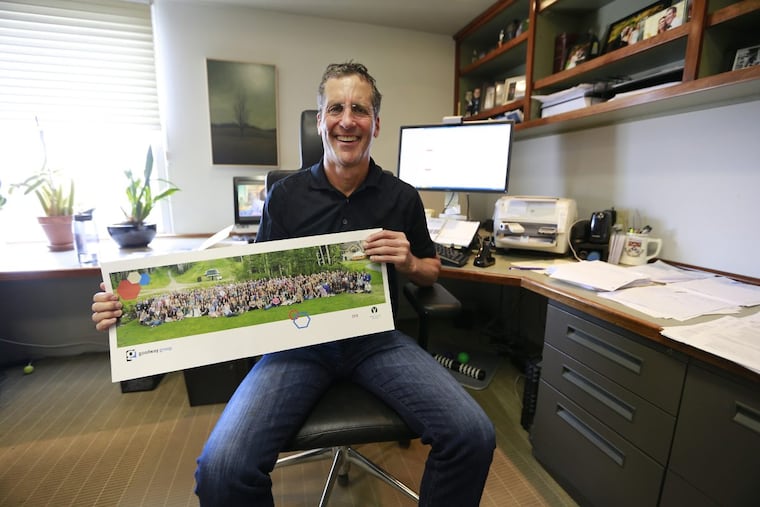What's it like to manage employees you never see? Philly CEO David Wolk has 400 examples
Walking into Goodway Group's corporate headquarters in Jenkintown is more than a little bit surrealistic. No fancy lobby. No receptionist. In fact, no people at all. Only the chief executive is there and one or two others.

Walking into Goodway Group's corporate headquarters in Jenkintown seems a bit surrealistic, especially for a company with 400 employees.
No fancy lobby. No receptionist.
In fact, no people at all. The office looks as if a mysterious force vaporized nearly all the occupants, leaving empty cubicles, lonely phone lines, and orphaned computer monitors. Only the chief executive is there, and one or two others.
And that's on purpose.
Now in its third generation, the family-owned media buying company's 400 employees live everywhere but here. Only a handful, including CEO David Wolk, 61, work here. Face time in front of the boss? Can't happen. When Wolk holds a company meeting, he gathers them at a resort.
Before we get to your workforce, explain your business. Your grandfather started a printing business, specializing in advertising brochures. The company moved into direct mail advertising. Since 2006, you trade only in online advertising.
In the old days, you used to write an insertion order and you'd deliver on that buy [placing a print ad in a newspaper, for example]. Now we have media traders that go to a dashboard. The dashboard is going to start with a profile of our user we're targeting. Is she female? What are the demographics? What are the psychographics? Then, it goes into servers that connect inventory in the marketplace.
Inventory?
All the users are surfing around all over the place. We're looking at finding users. There's a profile on Jane, from what we know from your cookies and your web surfing. We know enough about you that you may fit into a campaign we're doing for a hospital in Philadelphia, or a political campaign, or a car. If you fit in as a user whom we want to target, then where are you? On your iPad, or the New York Times, or the Inquirer. Let's serve her an ad. We want to target people like Jane and Jane look-alikes. Other people also want to sell to Jane. Suddenly, there's competitive bidding. It's like Google, the whole search world. You bid to get your listing at the top. The same thing for the banner ads we're serving. Once we profile who we want, our traders put all the parameters in. Then, literally, we press a button and start delivering ads.
How do you get paid?
On a cost per thousands impressions basis. For every thousand ads I can get in front of the right person, you are going to pay me $X per thousand.
OK, back to workforce. Why did you pick that strategy? And these are full time, not contractors, right?
Yes, full time. In 2006, we made the move to digital. I put out ads and went out on Monster and looked in Philadelphia and tried to find people who knew HTML. Then we needed people who knew how to buy search, how to buy trading. It's kind of a specialized world. I said, "All right, if I can't find enough people in Philly, I'll find them in New York." I couldn't find them in New York, so we had to look across the country. We found great people, outside of the tech hubs. We're in Tulsa, the Dakotas. We need the best person and it doesn't matter where you live. So it was out of necessity.
Who is your typical employee?
First of all, we are about 75 percent female, average age 35. We have a lot of moms with kids. There's this whole thing about being a super mom and having a great job, but also having some flex time to take care of everything.
It’s hard to work at home with a little kid running around.
They really do need help, or babysitting, or a nanny, because yes, you can't raise your kids and work and be on Skype. We also have digital nomads.
Do you mean people who work for you while traveling?
Like Amanda. She's from Seattle. She spent the winter in Florida and that's her working virtually by the beach [in her RV]. We have an employee who went to visit family in Vietnam for three months. She worked all night, because of the time difference. You hear about work/life balance. We call it work/life integration. Live large, work hard, and you know what? You can do both.
DAVID WOLK:
Home: Rydal.
Family: Wife, Sue Wolk; children, Ali Tucker, 30, Mike, 28.
Diplomas: Abington High School, University of Pennsylvania's Wharton School.
Weakness: Reese's peanut butter cups, Snickers bars.
True love: '67 Corvette. "I used to be an obsessive car cleaner -- get it pristine." Now he'd rather play golf.
GOODWAY GROUP:
Where: Jenkintown.
What: Online media strategist and buyer.
Customers: Advertisers and mid-sized advertising agencies.
History: Third generation advertising business, founded by his grandfather, Milton Wolk, in 1929. Started with printing, direct mail. Switched to online in 2006.
Employees: 400, all W-2 employees, all virtual. Only about 30 in the Philadelphia area.